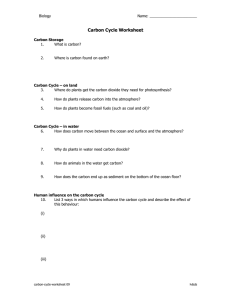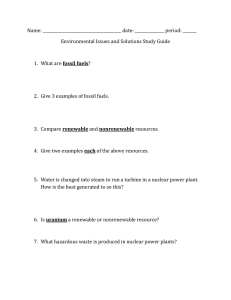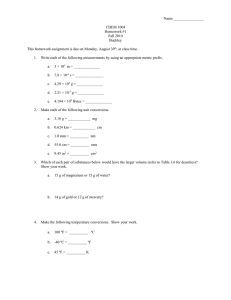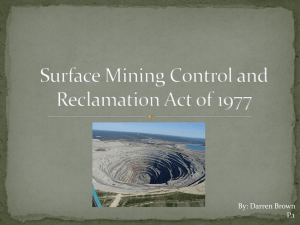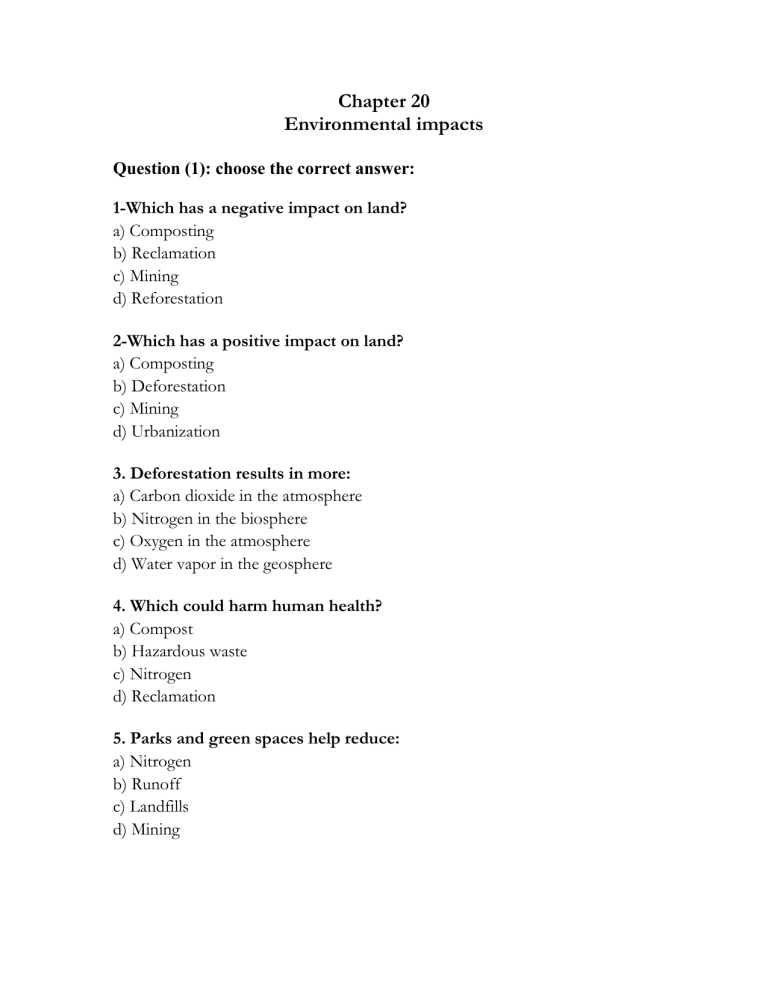
Chapter 20 Environmental impacts Question (1): choose the correct answer: 1-Which has a negative impact on land? a) Composting b) Reclamation c) Mining d) Reforestation 2-Which has a positive impact on land? a) Composting b) Deforestation c) Mining d) Urbanization 3. Deforestation results in more: a) Carbon dioxide in the atmosphere b) Nitrogen in the biosphere c) Oxygen in the atmosphere d) Water vapor in the geosphere 4. Which could harm human health? a) Compost b) Hazardous waste c) Nitrogen d) Reclamation 5. Parks and green spaces help reduce: a) Nitrogen b) Runoff c) Landfills d) Mining 6. Which results in habitat destruction? a) Reclamation b) Reforestation c) Urbanization d) Conservation 7. What is the development of land for houses and other buildings near a city called? a) Composting b) Mining c) Ruralization d) Urbanization 8. When land is over farmed or overgrazed, soil erosion can lead to: a) Desertification b) Urbanization c) Reclamation d) Deforestation 9. Besides disturbing habitats, roadways increase: a) Wastes b) Mining c) Agriculture d) Runoff 10. Which of the following is not one of the 3 R's humans can practice to minimize their effects on the environment? a) Reduce b) Remix c) Reuse d) Recycle Answer Key 1. c 6.b 2. a 7.d 3. a 8. a 4. b 9.d 5. b 10.a Assessment 2 Question (1):Choose the correct answers 1-Which of the following is a finite resource? a) Solar energy b) Wind energy c) Trees d) Fossil fuels 2. Fishermen have harvested certain fish to the point where the population of that fish is decreasing. This level of direct harvesting could cause a) Ecosystems to be improved for future generations b) Ecosystems to be severely damaged c) The restoration of environmental stability d) All other fish species to increase in number 3. Which human activity would preserve nonrenewable resources? a) Deforestation b) Removing carnivores from a forest c) Recycling d) Heating homes with fossil fuels 4. Increased industrialization will most likely a) Decrease available habitats b) Increase environmental carrying capacity c) Increase the stability of ecosystems d) Decrease global warming 5. Which human activity is correctly paired with its likely future consequence? a) Overfishing in the Atlantic — increase in supply of flounder and salmon as food for people b) Development of electric cars or hybrid vehicles — increased rate of global warming c) Use of fossil fuels — depletion of underground coal, oil, and natural gas supplies d) Genetically engineering animals — less food available to feed the world’s population 6. Which of the following is NOT a source of pollution in the ocean? a) Nitrogen and phosphorus from fertilizers used on land. b) Oils found on city streets. c) Sand drifting along the bottom of the ocean floor. d) Emissions from gas-burning vehicles. 7. Which of the following is NOT a method of energy conservation? a) Taking public transportation to work (bus, subway) b) Riding your bike to work c) Walking to work d) Driving alone in your car to work 8. Pollution can cause harm to the ___________. a) Air b) Land c) Water d) all of the above 9. What is one way humans are trying to positively impact the ocean? a) Fishing b) Creating artificial reefs c) Harvesting oil and natural gas d) Transporting goods in ocean vessels 10. Conservation is the act of conserving, or protecting the environment, plants, and animals. What are some things you can do to help conserve our environment? a) Leave water on, leave TV on, run dishwasher with 1 plate b) Run the washing machine with 1 shirt c) Leave the refrigerator door open d) Turn off water, turn off lights, and turn off TV 11. The impact on the planet due to global warming is called... a) Climate change b) The seasons c) The weather d) Natural change 12. The amount of carbon dioxide (CO2) in the atmosphere is currently decreasing. a) True b) False 13. Which human activity contributes the MOST carbon dioxide to the atmosphere? a) Fishing b) Breathing c) Burning Fossil Fuels d) Farming 14. How are greenhouse gasses harming our environment? a) They aren't b) Less heat is able to escape causing the Earth to cool down c) Less heat is able to escape causing the Earth to warm up d) More heat is able to escape 15. What evidence is there to support that Global Warming is occurring? a) Rising ocean temperatures b) Declining arctic sea glaciers c) Sea levels rising d) Increase in carbon dioxide in the atmosphere Answer Key 1. d 2. b 3. c 4. a 5. c 6. c 7. d 8. d 9. b 10. d 11. a 12. b 13. c 14.c 15. a,b ,c,d
